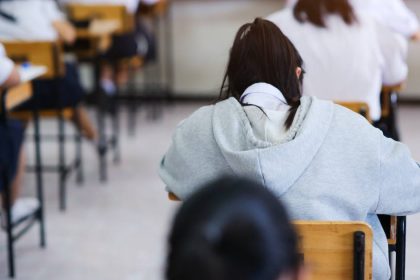2023 Bureau of Crime Statistics and Research (BOSCAR) data show NSW school assaults increased by 50 per cent from 2013 (1,297 to 1,992 calls to police, with an average of 10 incidents reported per school day).
New South Wales (NSW) Secondary Principals’ Council Deputy President Denise Lofts believes these figures hint at a deeper issue of increased poor student behaviour, and that this “low-level classroom disruption” is notably challenging for teachers.
Australian students in a tailspin
A 2018 Organisation for Economic Co-operation and Development study identified Australia as having some of the most disorderly classrooms on the planet, coming in at 69 out of 76 worldwide. Research by Dr. Erin Leif, a senior lecturer at Monash University’s Faculty of Education, points to School Wide Positive Behaviour Support (SWPBS) as the key to diffusing growing behavioural issues. The aim is to mitigate the pattern of disruptive behaviour leading to students falling behind, and students falling behind leading to increasingly disruptive behaviour as students “mask how behind they are by behaving badly,” says Ms. Lofts.
The School Wide Positive Behaviour Support (SWPBS) framework
School-wide positive behaviour support (SWPBS) is a framework that brings an entire school community together to create a positive learning environment, with a culture of safety and support.
It’s employed worldwide and lauded for giving both teachers and students more time to focus on nurturing relationships and learning by setting clear, consistent expectations and positive values.
The framework details clear positive behaviour expectations and provides a matrix that defines what constitutes minor and major behavioural incidents, and at what level they should be dealt with.
Anger management resources for teachers
SWPBS is an evidence based school framework.EducationDaily has compiled this set of student anger management resources to support it, and to further empower teachers as they contend with disruptive students in the classroom.
School-Wide Positive Behaviour Support: The Australian Handbook
School-Wide Positive Behaviour Support: The Australian Handbook is an authoritative guide to including the SWPBS framework in school operations. It was written by researchers and practitioners from a range of Australian universities. It’s a great starting point for kindergarten and year one educators, particularly in light of a recent study by University of NSW Professor Rebecca Collie. She found that students engaging in disruptive behaviour in their first year of school had significantly lower scores in year three and year five NAPLAN tests.
The Interventions Plus RAGE Anger management training
RAGE (Re-Navigating Anger and Guilty Emotions) has been awarded a Certificate of Merit by the Australian Crime and Violence Prevention Awards. It is a six-week, 12-hour Interventions Plus program, designed by founder and director Kenneth Nathan and Carol Musgrave for young people who have difficulty controlling their emotions.
The program is aligned with PDHPE K-10 outcomes for “building resilience and respectful relationships, and demonstrating self- management skills to reflect and respond positively to challenges”. It helps students to identify triggers, explore the feelings they evoke, and learn alternative strategies.
This course was developed in 2006 “to address the problem of angry, out of control teenagers, living at home, whose parents feel disempowered to deal with them”. It uses a Strengths-Based Solution-Focused framework, empowering young people to be more aware of their anger and to gain control of it.
RAGE consists of these six two-hour sessions:
Session One – The Many Faces of Anger, anger recognition skills
Session Two – The 4T’s Anger Cycle, identification of triggers & thoughts
Session Three – Healthy expressions of anger
Session Four – Dealing with guilt
Session Five – Self-care (Diet, exercise, relaxation)
Session Six – Summary, Awards, Evaluation
The RAGE facilitators training for educators is a one-day training program from 9.30am to 3.30pm. This hands-on, practical course, with a kinaesthetic approach and no writing, teaches young people how to express their anger in non-violent ways.
The Interventions Plus MAAD workshop
MAAD (Managing Angry Adolescents Differently) is a six-hour workshop created by Kenneth Nathan and Carol Musgrave. It’s designed to equip service providers, parents, carers, and teachers working with angry adolescents with the skills needed to understand anger and manage it proactively.
This workshop was created in response to requests from parents of teen participants of RAGE groups and service providers working with adolescents. It focuses on:
- Understanding the drivers of adolescent anger including brain development, attachment disruption and experiences of neglect and abuse
- Developing skills to effectively engage at-risk adolescents and manage challenging behaviours
MAAD workshop content addresses:
- Theoretical base for working with angry adolescents
- Understanding the adolescent brain
- Profiles of violent teens
- Features of violent adolescents
- Creative engagement
- De-escalation skills
- Skills to teach adolescents
- Self-care
- Resources
Intervention Plus founder and director Kenneth Nathan says, “I offer this workshop for all professionals who work with angry and violent adolescents. There’s a lot of theory, as well some practical skills for verbally de-escalating students.”
The Interventions Plus Making of an Effective Mentor workshop
MENTORING 1 on 1: The Making of an Effective Mentor is a half-day beginner’s workshop, which equips teachers with effective skills and strategies to successfully mentor at-risk adolescents.
Session One – Mentoring: What is it? explores:
- Definition of Mentoring
- The need for Mentors
- Clarification of Roles and Responsibilities Benefits of Mentoring
Session Two – Ethics in Mentoring explores:
- Confidentiality Duty of Care
- Legislation and Child Protection Mandatory Reporting Setting Personal Boundaries
Session Three – Nurturing the Mentoring Relationship Developing the Mentoring Relationship Communicating Effectively explores:
- Cultural and Social Sensitivity
- Acceptance of Individual Differences
Session Four – Teenagers and Development Understanding Adolescence explores:
- Issues Conflict Resolution
- Crisis Management
- Resources, Referrals and Supports
Session Five – Opportunistic Community Mentoring explores suggested mentoring activities.
Session Six – Relationship Closure explores the ‘closing’ of the mentoring relationship.
Taming Anger
Taming Anger is a free resource book created by Adelaide South Behaviour Support Service. Within its pages, you’ll find a collection of teacher resources used and developed by the Behaviour Support Service – Adelaide South to help students to discover, legitimise and analyse their anger.
The book has two major components:
- Student worksheets that assist students to explore their anger
- Teacher information concerning strategies and practices that are effective with angry students.
The basic goals of Taming Anger are:
- To explore the components of an individual’s anger
- To unpack the skills needed to enable the individual to manage their anger more appropriately
- To explicitly teach these skills
Taming Anger functions as a proactive component of a coordinated school approach to managing students who are challenged by their anger. It should be used for explicitly teaching small groups of identified students how to manage their anger, empowering them to make responsible behavioural choices. The development of these skills should then assist students to achieve successful learning outcomes, breaking the pattern referred to by Secondary Principals’ Council Deputy President Denise Lofts.
Anger Control Training
Anger Control Training is a paperback activity-style book, written by Emma Williams and Rebecca Kelly and first published in September 1998.
This training manual addresses the need for a practical and easily accessible guide for professionals working with people presenting with anger problems. It is suitable for use by psychologists, OTs, psychiatric nurses, probation officers, psychiatrists, social workers and teachers. The book includes an abundance of materials that can be copied and distributed, including handouts and facilitator guides, and role-play and relaxation resources.
Anger Control Training is essentially a comprehensive programme that uses a cognitive-behavioural approach and is designed to support educators in helping students change their thoughts, feelings and behaviour.
Raise mentoring
The Raise youth mentoring program has delivered nearly 900 early intervention, evidence-based youth mentoring programs at secondary schools in six states across Australia since 2008.
7,200 volunteers have been trained and matched with students who were identified as potentially “benefiting most from having a caring, trusted adult who shows up for them during each week of the six-month program”.
Programs are managed by qualified Raise Program Counsellors who have worked with school partners to support almost 11,000 young people aged 13-15 in years seven to nine.
One-hour programs are run on the same day and time each week during the school term with the Program Counsellor as the single point of contact responsible for supervising volunteer mentors as they work one-to-one with up to 15 students per school.
Here’s what to expect when your school is registered:
Pre-program
- Meet your Raise Program Manager (PM) to discuss the mentor recruitment plan
- Welcome meeting with your Program Counsellor (PC) and PM
- PC hosts a student information session
- Select mentees together with your PC and obtain parent/carer consent
Program delivery
- Mentee and mentor orientations conducted by PC (weeks one and two)
- Jitters – program launches (week three)
- Program runs weekly throughout term time
- Graduation
- The gift of goodbye – program concludes (last week of program)
Post program
- Post-program evaluation
- Program review using Parent/Carer and school surveys
- Wrap up meeting and planning for following year
- Sign School Partnership Agreement Form for following year
These are some of the most effective avenues for Australian educators to explore when researching how to improve increasingly difficult student behaviour.
These resources can assist with decreasing the number of disengaged students falling behind in their studies by creating environments for respectful and positive behaviour, built on respectful relationships between students and staff.







